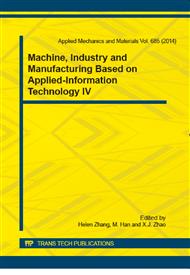p.55
p.59
p.64
p.68
p.72
p.76
p.80
p.85
p.90
Influence of Fusible Interlining on Draping Modeling Ability of Fabrics
Abstract:
In the design of modern garment, fabrics have a remarkable influence on the garment styles and modeling. This paper, taking the flare skirt as an example, discusses the draping ability of six kinds of different fabric slitting under the conditions of bare chip and adhesive through the experiment. The study shows that the whole modeling of the skirt pieces after adhesion with fusible interlining, will show the changes of the reduced drapability and the reduced angular line numbers and the formed wave’s position dot will move downward. The length of wave will be shortened, the overall width will be widened and the drapability will be worse. The morphology of the bottom wing will have obvious change, that is the bottom wing will become larger and the wave depth of bottom wing become larger. The wave arrangement of the skirt pieces after adhesion takes on the asymmetry condition and the pleating effect of the bottom wing will become worse. In the pattern design of apparel, the effect of the fusible interlining on the fabrics draping modeling should be taken into consideration, which can complete accurately the transformation of style-structure-process and thus serve well with the apparels industrialized production.
Info:
Periodical:
Pages:
72-75
DOI:
Citation:
Online since:
October 2014
Authors:
Keywords:
Price:
Сopyright:
© 2014 Trans Tech Publications Ltd. All Rights Reserved
Share:
Citation:


